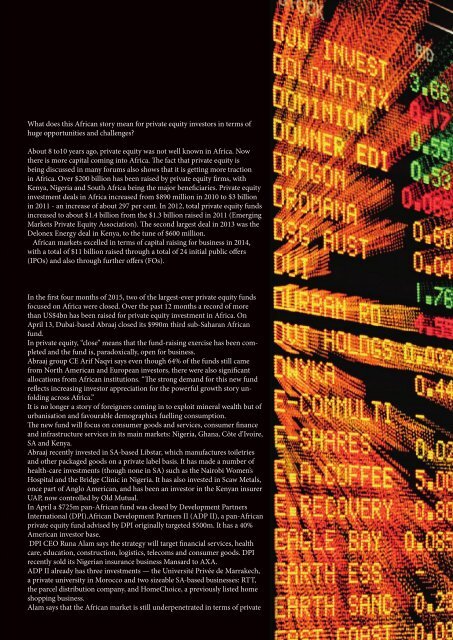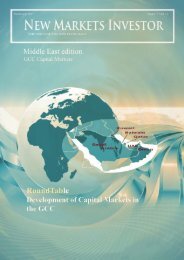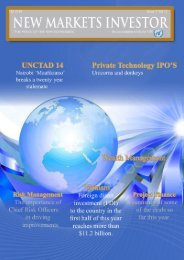New Markets Investor
Published by The Media Corporation
Published by The Media Corporation
Create successful ePaper yourself
Turn your PDF publications into a flip-book with our unique Google optimized e-Paper software.
Q3 2015What does this African story mean for private equity investors in terms ofhuge opportunities and challenges?About 8 to10 years ago, private equity was not well known in Africa. Nowthere is more capital coming into Africa. The fact that private equity isbeing discussed in many forums also shows that it is getting more tractionin Africa. Over $200 billion has been raised by private equity firms, withKenya, Nigeria and South Africa being the major beneficiaries. Private equityinvestment deals in Africa increased from $890 million in 2010 to $3 billionin 2011 - an increase of about 297 per cent. In 2012, total private equity fundsincreased to about $1.4 billion from the $1.3 billion raised in 2011 (Emerging<strong>Markets</strong> Private Equity Association). The second largest deal in 2013 was theDelonex Energy deal in Kenya, to the tune of $600 million.African markets excelled in terms of capital raising for business in 2014,with a total of $11 billion raised through a total of 24 initial public offers(IPOs) and also through further offers (FOs).In the first four months of 2015, two of the largest-ever private equity fundsfocused on Africa were closed. Over the past 12 months a record of morethan US$4bn has been raised for private equity investment in Africa. OnApril 13, Dubai-based Abraaj closed its $990m third sub-Saharan Africanfund.In private equity, “close” means that the fund-raising exercise has been completedand the fund is, paradoxically, open for business.Abraaj group CE Arif Naqvi says even though 64% of the funds still camefrom North American and European investors, there were also significantallocations from African institutions. “The strong demand for this new fundreflects increasing investor appreciation for the powerful growth story unfoldingacross Africa.”It is no longer a story of foreigners coming in to exploit mineral wealth but ofurbanisation and favourable demographics fuelling consumption.The new fund will focus on consumer goods and services, consumer financeand infrastructure services in its main markets: Nigeria, Ghana, Côte d’Ivoire,SA and Kenya.Abraaj recently invested in SA-based Libstar, which manufactures toiletriesand other packaged goods on a private label basis. It has made a number ofhealth-care investments (though none in SA) such as the Nairobi Women’sHospital and the Bridge Clinic in Nigeria. It has also invested in Scaw Metals,once part of Anglo American, and has been an investor in the Kenyan insurerUAP, now controlled by Old Mutual.In April a $725m pan-African fund was closed by Development PartnersInternational (DPI).African Development Partners II (ADP II), a pan-Africanprivate equity fund advised by DPI originally targeted $500m. It has a 40%American investor base.DPI CEO Runa Alam says the strategy will target financial services, healthcare, education, construction, logistics, telecoms and consumer goods. DPIrecently sold its Nigerian insurance business Mansard to AXA.ADP II already has three investments — the Université Privée de Marrakech,a private university in Morocco and two sizeable SA-based businesses: RTT,the parcel distribution company, and HomeChoice, a previously listed homeshopping business.Alam says that the African market is still underpenetrated in terms of private<strong>New</strong> <strong>Markets</strong> <strong>Investor</strong>91









